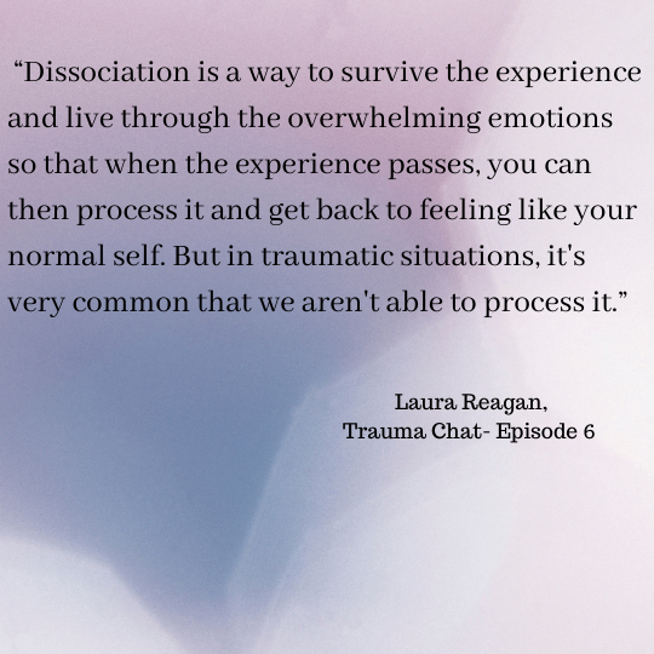
Many people have had the experience where they walk into a room in their house to get something and when they get into the room, they completely forget what it is that they came to get. Or, they go to drive somewhere and the next thing they know, they completely missed their exit. In fact, they seem to have sort of “zoned out,” while driving.
While these experiences are common and not necessarily a cause for concern, if someone begins to perpetually exist in a “zoned out” state. Or, if a person has trouble remembering chunks of time because their mind and body does not feel connected to the present moment whatsoever, these things can begin to really negatively impact a person’s life. All of the examples mentioned here are different versions of what is called trauma dissociation. This is the subject of discussion for Trauma Chat episode 6, as explained by Laura Reagan, LCSW-C.
To listen to the full episode of Trauma Chat episode six click here, or keep reading for an overview of episode six.
Understanding trauma dissociation– its function, and the ways that it manifests, is vital to developing a greater understanding of trauma. Plus it let’s use see how it impacts people.

The experience of trauma dissociation exists on a spectrum. In other words, there are experiences of dissociation that can be mild and not really affect someone’s life and functioning. Then, there are also experiences of dissociation which can seriously interrupt a person’s functioning. On the less intrusive side of dissociation is something like being preoccupied. Therefore, this causes us to be unable to really connect with the present moment.
On the other end of the spectrum Dissociative Identity Disorder could include “having another you that dresses differently, acts differently, speaks differently and has a different name that you don’t even know is there…” – note this is not the only way Dissociative Identity Disorder can show up. Along the spectrum of dissociation it can be helpful to pay attention to how much the individual is consciously aware of and engaged with their emotional and sensory experience in the present moment.
“There are many shades of dissociation and the way it shows up with us [varies]…”
Laura Reagan, Trauma Chat Episode Six
Types of Trauma Dissociation
Dissociation can show up a lot of different ways. Here are some examples of how it can look and feel when dissociation occurs, which are described in more detail below:
- Zoning out
- Feeling or appearing shut down
- Losing time
- Feeling disconnected from our bodies
- Having sensory flashbacks – what you see, hear, smell, taste and/or touch – including body sensations and thoughts – feels like another time
- Depersonalization
- Feeling separate, detached from our emotions or what is happening around us
- Derealization
Reactions to Trauma Dissociation
Zoning out→
Not hearing things that people are saying to you because you’re thinking about something else
Being shut down→
Someone tells you something that’s emotional and you are so overwhelmed and flooded with emotion in response to what they said that you can’t think, you don’t know how you feel, and you can’t speak
Losing time→
Being unable to have any recollection of what you did during multiple days at a time
Being separated from our emotions→
When you only know that you are experiencing an emotion because a certain thought pattern comes up but you are unable to actually experience feeling an emotion.
The disconnect between mind and body→
Feeling completely disconnected from your body as if you do not exist within it, you may lose the ability to feel sensation in large areas of your body
Flashbacks→
When you are reliving something that happened in the past and you don’t really feel like you are as present to what’s happening in the current moment. Instead, you feel as if you are back in the place where a traumatic event occurred.
The persistent or recurrent experience of feeling detached from, and as if one were an outside observer of one’s mental processes or body, for example, feeling as though you were in a dream, feeling a sense of unreality of self or body, or of time moving slowly (DSM-5).
The persistent or recurrent experiences of unreality of surroundings. For example, the world around the individual is experienced as unreal, dreamlike, distant, or distorted, and this is not due to the effects of a substance (DSM-5).
Why is dissociation a common reaction to trauma?
Dissociation is a common reaction to trauma. This happens because when we can’t take what’s happening in, the experience overwhelms our capacity to cope. According to Laura, “..dissociation is a way to survive the experience and live through the overwhelming emotions so that when the experience passes, you can then process it and get back to feeling like your normal self. But in traumatic situations, it’s very common that we aren’t able to process it.”

Find a Trauma Therapist in Our Directory for More Support!
If you’re ready to find the trauma therapist that is going to help you have a breakthrough then check out our online therapy directory. Know that we are regularly adding therapists to our directory. Therefore, the list will only continue to grow. To get started follow these steps:
- Head to our find a therapist page.
- Begin looking for a therapist in your area and select one that is a good fit.
- Visit their website and learn about our therapists.
- Get in touch and begin finding hope and healing!
*If you’re a trauma therapist who offers support for client’s in need of, or want to understand more about trauma dissociation, our directory is for you. If you’re looking to be a resource for individuals needing help, learn about our directory. Then, visit our page to get set up as a therapist today!
If you feel that the experiences described above resonate with you, you may struggle with dissociation.
*Listen to the full episode of Trauma Chat episode six here.
Resources for this Episode:
Dr. Janina Fisher’s book, Healing the Fragmented Selves of Trauma Survivors: Overcoming Self-Alienation
Susan Pease Banitt’s book, The Trauma Toolkit: Healing PTSD from the Inside Out




